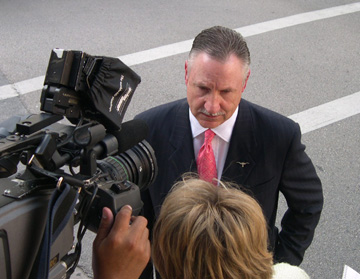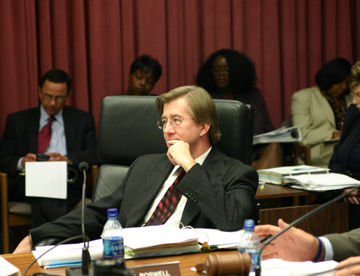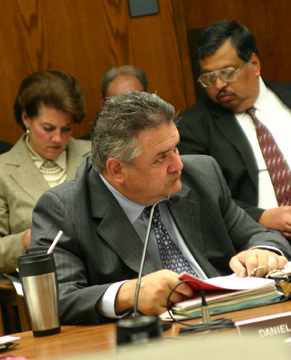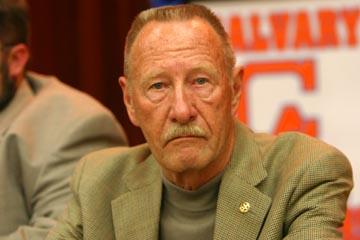 Those sentiments were odd coming from a mayor who has shown little interest in the committee. In 2004, shortly after Moncrief was sworn in, former city councilman Clyde Picht asked him to renew the five-person committee. Four of the members’ terms had expired years earlier, and a fifth member was unable to be reached (apparently because he had died). “That’s the first thing I brought up with Mike Moncrief when he got elected, our ethics committee,” Picht said.
Those sentiments were odd coming from a mayor who has shown little interest in the committee. In 2004, shortly after Moncrief was sworn in, former city councilman Clyde Picht asked him to renew the five-person committee. Four of the members’ terms had expired years earlier, and a fifth member was unable to be reached (apparently because he had died). “That’s the first thing I brought up with Mike Moncrief when he got elected, our ethics committee,” Picht said.
Moncrief expressed no intention of reviving it, Picht recalled.
City council member Chuck Silcox also approached Moncrief about breathing life back into the ethics panel. “At the time he didn’t feel like it was necessary,” Silcox said. .
Moncrief’s recent letter seems stranger still, coming from a guy who regularly votes in city council meetings on issues involving gas companies that provide him with tens of thousand of dollars in income, the same gas companies that drill under city parks and invade neighborhoods with noise, dust, heavy equipment, truck traffic, potholes, and the occasional gas leak, blowout, pipeline rupture, or fatal injury.
City officers aren’t supposed to “vote or otherwise participate in the consideration of the matter” when conflicts of interest arise. What constitutes a conflict of interest is open to interpretation, and the city attorney’s office views it in a way that gives Moncrief freedom to vote. However, the common-sense interpretation used by many people interviewed for this story suggests that anyone who gets $25,000 a year minimum and possibly much more from a company shouldn’t vote on their business. But Moncrief doesn’t recuse himself from participating in discussions or votes regarding oil and gas issues, including those with XTO Energy, Devon Energy, and Chesapeake Energy, all of which provide him with substantial income.
Picht put it more simply: “If he gets any money from them, he sure as hell shouldn’t vote on those issues.”
Financial disclosure statements filed by city officials provide glimpses into their lives and their livings. Moncrief’s makes it clear that he’ll be able to afford power ties and hair wax for many years to come. His 2005 disclosure statement lists him as self-employed with “investments and oil and gas production.” Under the heading “Income From Interest, Dividends, Royalties and Rents,” Moncrief listed more than 40 energy companies in Texas, New Mexico, and Colorado. Disclosure forms aren’t designed to reveal exact earnings — officials are asked to indicate general levels of income for each business (for instance, $10,000 to $24,999). The highest category is open-ended — $25,000 “or more.”
Moncrief listed 18 businesses in the highest category, meaning that the minimum total they provide him is $450,000. Some of those companies are actively drilling in the Fort Worth area and regularly going before area city councils, including Fort Worth City Council, to seek leases, permits, and rights of way. Moncrief regularly discusses and votes on those issues.
Currently, 440 wells are producing natural gas within the city limits. Another 52 are being drilled, and 139 are in the works (they’ve received permits but are still awaiting the availability of rigs).
![Yett: ‘I’m satisfied that [Moncrief] did not have a substantial interest that would require him to recuse from voting.’](https://www.fwweekly.com/wp-content/images/stories/images/archive/2006-11-21/feature_pic2_11-22.jpg) For the past few years, gas drillers have written letters, presented studies, and attended public hearings to convince the city how clean and safe natural gas drilling is compared to oil drilling. Then, last December, a blowout occurred in Palo Pinto County, burned for several days, left a crater the size of two football fields, and sparked secondary fires that spread over 50 acres. Four months later, an XTO well erupted in Forest Hill, killing a worker and causing the evacuation of 500 homes.
For the past few years, gas drillers have written letters, presented studies, and attended public hearings to convince the city how clean and safe natural gas drilling is compared to oil drilling. Then, last December, a blowout occurred in Palo Pinto County, burned for several days, left a crater the size of two football fields, and sparked secondary fires that spread over 50 acres. Four months later, an XTO well erupted in Forest Hill, killing a worker and causing the evacuation of 500 homes.
Representatives from XTO have gone before the Fort Worth council a half-dozen times in the past two years seeking lease agreements to drill under city parks or to use public rights of way. Most council members, including Moncrief, have voted favorably. Moncrief listed his income from XTO in 2005 as being between $10,000 and $24,999. He listed his spouse as owning between 1,000 and 4,900 shares of XTO stock — worth from $46,890 to $229,760 as of a few days ago.
Another major driller in the area is Devon. Moncrief checked the highest category — $25,000 or above — to categorize his income from them. The company recently purchased Four Sevens, one of the first companies to come calling on Fort Worth to allow it to drill under city property. Moncrief on numerous occasions in the past two years has voted to grant leases to both companies.
Moncrief also listed his income from Chesapeake in the top category — which means that, at minimum, he made $60,000 in 2005 from companies whose issues he has voted on, with the upper limit of that income unknown.
When it comes to drilling, the city’s most enthusiastic cheerleader is Moncrief. Although he won’t speak with Fort Worth Weekly reporters, he fairly burbles to other news outlets about how gas revenues can improve the city. Most recently, he told The New York Times that gas royalties would benefit residents for generations to come.
“It is without question allowing us to float everyone’s boat higher,” he said.
So he votes in favor of gas companies, just as he did at the Nov. 14 city council meeting when XTO was given permission to drill under yet another city park in exchange for a $2.6 million bonus and royalties of 26 percent.
Critics don’t see their boats floating any higher; they see their peace of mind, quality of life, and cozy neighborhoods interrupted by the dust and drone of drillers. They fret over blowouts and worry about odorless gas escaping and getting into their lungs and their children’s lungs. Environmentalists are troubled by the effect on the birds, butterflies, and plants that get tamped down by two-acre pad sites and “frac” water pits. They don’t want their boat floating higher if it’s surrounded by environmental decay and noisy clatter. And since most aren’t receiving royalties and bonuses, they don’t see themselves gaining benefits. They pay the same amount of taxes and out-of-pocket expenses as they ever have but must endure the drawbacks of drilling.
 Many residents are willing to accept gas drilling to a degree but expect the city to balance economic development with quality- of-life issues. James Munkittrick was among the first to express doubt about drilling inside neighborhoods when he sent a letter to city hall in November 2001, after drilling plans were announced in the Fossil Creek Estates in North Fort Worth. Five years later, the neighborhood has gas wells, but the impact wasn’t as bad as he feared.
Many residents are willing to accept gas drilling to a degree but expect the city to balance economic development with quality- of-life issues. James Munkittrick was among the first to express doubt about drilling inside neighborhoods when he sent a letter to city hall in November 2001, after drilling plans were announced in the Fossil Creek Estates in North Fort Worth. Five years later, the neighborhood has gas wells, but the impact wasn’t as bad as he feared.
“The city moved the wellheads far enough away,” he said. “They’ve done a pretty good job.”
Still, other neighborhoods haven’t fared as well, and Munkittrick keeps a wary eye on the future, especially when so much money is at stake.
“The city wants the money and the fees, and individuals want the royalties, but is the city going to do it carefully?” he said. “Their first obligation is to people. Their second obligation is to money. I hope that they don’t get confused.”
Moncrief focuses on how the bonanza can improve the entire city. If improved services benefit hundreds of thousands of people, the theory seems to be, why worry about a few thousand people whose primary investments — their homes and peace of mind — are shattered by gas wells plopped down in the middle of their neighborhoods? Opinions on drilling vary, and Moncrief’s entitled to his.
The mayor has held strong opinions throughout his many years of public service, something Texas Christian University political science professor Don Jackson has always admired about the man.
“I am a contributor to Mike Moncrief and a great fan of his politically,” Jackson said. “I thought he was a particularly good senator and took a lot of politically courageous stances.”
Jackson doesn’t see a problem with Moncrief talking in broad terms about the Barnett Shale and natural gas drilling. But when a vote comes up and there is a conflict of interest, or even the appearance of one, it’s best to err on the side of caution, he said.
“The best practice is, you recuse yourself from any participation in the discussion or the vote on any issue in which you have a financial interest,” he said. “It’s a common-sense rule.”
 By 2000 it had become obvious that Fort Worth is sitting smack-dab atop one of the country’s largest natural gas reserves. The city faced tough questions about how to handle the large number of drilling companies eager to punch straws into the ground — any ground, whether it was a city park, school, or neighborhood. Some cities have embraced drilling and the subsequent influx of money into their economies and general funds; others prefer to protect quality of life and fight to discourage drillers and tighten the ordinances that regulate them.
By 2000 it had become obvious that Fort Worth is sitting smack-dab atop one of the country’s largest natural gas reserves. The city faced tough questions about how to handle the large number of drilling companies eager to punch straws into the ground — any ground, whether it was a city park, school, or neighborhood. Some cities have embraced drilling and the subsequent influx of money into their economies and general funds; others prefer to protect quality of life and fight to discourage drillers and tighten the ordinances that regulate them.
Fort Worth was still grappling with this question when Moncrief announced his candidacy for mayor in 2003. Moncrief’s relationship with gas drillers is no secret. He comes from a family made wealthy through drilling revenues in a state that has embraced the oil industry for the past century. Becoming mayor could have been considered a step backward in his career. He had been a senator for the previous 12 years, and before that he had served as a state representative and Tarrant County judge. Some residents hatched a theory: A man with strong oil-and-gas connections yearning to become mayor of a city atop a huge energy reserve must be out to line his own pockets. Real estate investors, developers, attorneys, title company owners, and many other entrepreneurs can benefit financially from being able to shape policy and wield power at city hall.
“Now we know why people worked for free on the city council for so many years,” local activist Louis McBee said. “This is a good-old-boy city. There have to be perks somewhere.”
For two years before Moncrief arrived, many residents had been telling city hall that they wanted protection from gas drillers. Moncrief wasted little time in letting folks know where he stood. He touted drilling from the start. The city council formed a task force to study the city’s drilling ordinance, but it was stacked heavily with drillers and developers.
“I can’t help but think maybe Mike was brought here to help ease the way for gas drilling in Fort Worth,” said Gary Hogan, a task force member and president of the Chapel Creek Neighborhood Association. “He was a great state senator and did a lot for poor people … but seeing the timing where Moncrief came to the city, I can’t help but think there were conversations at the Petroleum Club about bringing him back here.”
Not surprisingly, the pro-industry members of the task force overrode the few neighborhood reps who expressed worries about drilling. One of the neighborhood reps, Danny Scarth, ended up accepting money from the energy industry to help fund his bid for a city council seat, which he won in a tight election against McBee.
Hogan was dismayed by what he saw as Scarth’s sell-out and the task force’s bias.
“Every time I talked to [Scarth] it seemed like I was talking to an industry person, because he would give me the same rhetoric that an industry person would,” Hogan said. “He was supposed to be representing citizens.”
The task force had met about a half-dozen times and was close to giving the city council its opinions regarding a drilling ordinance when the Forest Hill gas well erupted. Moncrief talked tough then, asking the task force to increase the recommended distance between homes and gas wells from 200 to 600 feet.
 The increased 600-foot setback, however, isn’t set in stone. Hundreds of gas wells are grandfathered in with smaller setbacks, and gas companies can go before the city council and ask for high-impact permits that allow them to get around the tighter restrictions.
The increased 600-foot setback, however, isn’t set in stone. Hundreds of gas wells are grandfathered in with smaller setbacks, and gas companies can go before the city council and ask for high-impact permits that allow them to get around the tighter restrictions.
“The fact is, we’re going to have gas wells drilled at 200 feet because I don’t see the city of Fort Worth refusing somebody [permission] to go back into a pad site and re-drill,” Hogan said.
Perhaps the task force’s biggest critic was FWCanDo founder Don Young. He demanded a 3,000-foot setback. Privately, he indicated he would grudgingly accept a 1,000-foot setback, similar to those in other cities such as Trophy Club. He wasn’t impressed by Moncrief’s suggestion to increase the setback to 600 feet. To Young, it was just another savvy political move by a politician getting rich(er) from drilling yet not having to endure the resulting problems. After all, wealthy neighborhoods with powerful and influential homeowners are less likely to be affected by drilling.
Young’s disdain for Moncrief was cemented during a visit to city hall earlier this year. A Devon Energy representative was about to go before the city council and ask for a high-impact drilling permit (drillers who want to circumvent the setback ask for a special permit and participate in a public hearing). Before the hearing, Young was standing in the hallway outside council chambers and noticed a city gas inspector talking and looking over papers with the Devon representative.
“I walked over there and said, ‘I can’t believe you’re coaching this guy,’” Young said.
The city council voted 8-1 in favor of the permit, with Kathleen Hicks as the lone dissenter. An infuriated Young confronted Assistant City Attorney Sarah Fullenwider outside council chambers and complained about what he considered the staff’s improper coaching of the gas rep. The city inspector and the Devon representative stood nearby listening to the exchange. Meanwhile, the city council meeting was still in progress and had moved on to other business.
“At that very moment, Moncrief came bursting through the door,” Young said. “He walked over to the Devon guy, put a hand on his shoulder, congratulated him, and shook his hand. I thought, ‘Why is he out in the hall congratulating this guy?’ That had a major impact on me.”
A smiling Moncrief then turned around and walked back into the meeting.
“It may not be illegal, but it is certainly unethical,” Young said.
 Young went to the city manager’s office and filed what he thought was an ethics complaint that same afternoon. Instead, his protest was taken as a “citizen complaint” and forwarded in a city memo to Yett, Boswell, and several other city officials. Regardless, Young said he never heard anything else about it.
Young went to the city manager’s office and filed what he thought was an ethics complaint that same afternoon. Instead, his protest was taken as a “citizen complaint” and forwarded in a city memo to Yett, Boswell, and several other city officials. Regardless, Young said he never heard anything else about it.
By city ordinance, Fort Worth’s five-member ethics committee is supposed to meet quarterly, review ethics complaints, issue advisory opinions, and discuss ways to improve ethics in city government. However, the committee has been mostly inactive for 10 years. Moncrief’s recent letter about reviving the committee downplays that fact. “The term for the members currently serving has expired, however I am advised that the members continue to hold office until successors are duly appointed,” he wrote.
The members might technically continue to hold office, but they aren’t holding meetings or doing other things they are charged with by the city code. The committee’s most recent “action” occurred two years ago, following the filing of an ethics complaint against the mayor and two city council members. Cabela’s was planning to open its huge sporting goods store on land purhased from Ross Perot Jr.’s Hillwood development in North Fort Worth and wanted tax breaks, specifically a tax increment financing district (TIF). These districts were designed to spark development in blighted areas but instead have been used repeatedly in Fort Worth to attract corporations to prime spots of land usually owned by well-connected investors such as Perot.
Moncrief and city council members Wendy Davis and Jim Lane accepted a free ride on Perot’s private jet to view a Cabela’s store in Kansas City. They later voted in favor of creating a TIF to attract the company to the Alliance area. To McBee, they had crossed an ethical line and appeared to be representing Cabela’s rather than the city taxpayers. McBee filed an ethics complaint, charging that the trip violated the portion of the ethics code that prohibits a city officer from accepting or soliciting benefit from anyone who has “personal financial interest in any proposed ordinance.”
Pulling together a quorum of the ethics committee wasn’t easy. Their terms had expired, and they hadn’t been meeting regularly. An assistant city attorney checked into the situation and wrote, “The committee still has the same [five] members with the exception of one, who is believed to be deceased.”
The four surviving members met and called Moncrief, McBee, and the other involved parties to what was described as an informal review to determine if the complaint would go to a hearing.
“The only one who didn’t have a lawyer with them was me,” McBee said. “They heard the case right then and there and determined that the trip constituted the city council working for the city in good faith. I was so disgusted at the time.”
From the beginning, McBee said, he was badgered by committee members and put on the defensive.
“It was so obvious from the attitude of that group that the outcome was certain,” he said.
Looking at the meeting’s transcript all these months later, committee members appear to have treated McBee with disdain. Assistant City Attorney Cynthia Garcia, who attended the meeting, disagreed. She said the committee gave McBee a fair hearing before ruling against him.
Eastside resident and Greater Meadowbrook News publisher Wanda Conlin attended the meeting with McBee and supported his version of events. The committee members appeared to be clueless much of the time but were clearly there to support the city, not to provide a fair hearing, she said.
“It was almost like a kangaroo court,” she said. “They were not interested at all. They were very condescending. Some of the remarks were things like, ‘Isn’t this the way people do things all the time?’ That’s a funny remark from an ethics committee.”
Conlin recalled leaning over to McBee and telling him that he wasn’t going to get a fair hearing. “We could tell immediately the decision had already been made that there was no ethics violation,” she said, “even though its pretty clear you don’t get on a plane and meet with people and decide there is going to be a TIF and come back and — prior to a city council vote — say, ‘Cabela’s is coming, Cabela’s is coming.’”
State Rep. Lon Burnam has known Moncrief for years and said many people misunderstand the mayor’s motives for public service. Moncrief has been a public official for three decades and currently serves on more than 50 boards, committees, and organizations, including the D/FW International Airport Board and the Alliance Airport Authority (both airports are heavily involved in gas drilling).
Despite the potential for conflicts of interest, Moncrief separates his business interests from his desire to serve the public, Burnam said, something not so uncommon among people with plenty of money.
“Mike is driven to public service,” the legislator said. “Mike doesn’t need the money. Mike does public service because he likes to be at the center of making things happen.”
People who think Moncrief sought to become mayor of Fort Worth to manipulate oil and gas ordinances and line his own pockets are way off base, he said.
“I’m not suspicious of his motives on this,” Burnam said. “Mike is not a malicious person. He has a different world view than the average homeowner in Fort Worth has because their major wealth is their homes, and they want to protect that home, and they want their government to be protective of that home.”
Royalties from gas drilling under city property are expected to produce many millions of dollars in the coming years, providing more city services without raising taxes. That’s the attraction to Moncrief, he said.
Still, Burnam is troubled by Moncrief’s refusal to recuse himself from city council votes involving companies in which the mayor is personally involved. Just because Moncrief views himself as ethically sound and unwilling to be bought doesn’t mean that he should ignore appearances, he said.
“He’s wrong on some of the votes he has taken; he should have recused himself,” Burnam said. “It undermines the public trust in our elected officials.”
So what’s driving Moncrief to resurrect the ethics committee when he’s shown no interest in the past?
“I would imagine it’s all the recent unethical things that have happened,” said city council member Donavan Wheatfall. “City council members are charged with ensuring the public trust, and a part of that is putting policies in place like an ethics review committee that helps us oversee the conduct of employees and other officials.”
Theft at city hall, more than $4 million in missing money, ineptitude or worse in the finance department, and a city retirement fund that might require a taxpayer bailout are among the issues that have diminished public confidence in its leaders recently.
City Manager Charles Boswell, who oversaw the finance department while money was going missing, said the ethics review committee’s revival isn’t related to these recent fiascos. “Issues in the finance department were performance issues and not ethics,” he said. “In the retirement fund, it’s much the same.”
The timing of the ethics committee revival is coincidental, he said. “The city secretary’s office did a review of all our various boards and committees where there were positions that needed to be filled, and this was one of them,” he said. “A number of boards have people who have been on there long past their term limits.”
Without a working ethics committee, the city attorney’s office becomes the primary interpreter of the city’s ethics code. City attorneys decide whether conflicts of interest exist and whether the mayor or council members should refrain from discussing or voting on issues. City Attorney David Yett saw nothing wrong with Moncrief voting last fall in favor of the city doing business with a company that uses a title company that employs his son, Troy Moncrief, as an officer.
While Yett saw nothing wrong with the mayor neglecting to reveal his son’s interests in the company, some council members were aghast. They criticized Moncrief for not recusing himself from the vote and questioned the city attorney’s advice on this and other ethical rulings. The mayor was also accused of violating state open meetings laws by polling council members one at a time before asking former City Manager Gary Jackson to resign in 2004.
The city’s ethics code, established in 1978, provides penalties for ethical lapses that range from a slap on the wrist to removal from office by a majority vote of the council. But politics being what it is, expecting the council to kick out a powerful and persuasive mayor is more than a stretch.
Former councilman Picht insists Moncrief’s votes are in violation of the state ethics code. Maybe so, but the Texas Ethics Commission couldn’t care less. The Weekly attempted to discuss the mayor’s financial interests and votes on gas issues, but state commission spokesman Tim Sorrells wanted no involvement.
“Our jurisdiction doesn’t extend to the city; we deal with matters at the state level,” he said. Sorrells suggested asking someone on the city level about whether Moncrief’s situation was ethical or not.
The city manager is top dog in Fort Worth’s “council-manager” form of government, but Boswell wasn’t keen on discussing whether Moncrief’s votes on gas drilling violated the ethics code. “I’m not even going to wade into that,” he said, referring further questions to Yett.
Assistant City Attorney Cynthia Garcia explained that the ethics code bans officials from taking part in issues involving companies in which they hold a “substantial interest” — that is, if the official owns 10 percent or more of the company’s voting stock or shares or holds ownership worth $15,000 or more in the company based on fair market value.
However, the city’s financial disclosure statements include open-ended financial categories making it difficult to determine whether an official owns a substantial interest. Yett said he didn’t know the exact amount of interest Moncrief owns in gas companies, and he wouldn’t say whether he has advised Moncrief on votes involving Devon, XTO, or other gas companies. He cited client-attorney confidentiality.
City officers are welcome to seek his counsel, but “I’m not going to say what advice I give to city council members on legal matters,” Yett said.
Moncrief appears to own more than $15,000 in XTO and Devon stock, but Yett doesn’t consider that “ownership,” since Moncrief’s statement indicates he owns stocks rather than earning a salary or holding partnership status.
“I’m satisfied that he did not have a substantial interest that would require him to recuse from voting,” he said.
In Yett’s view, Moncrief’s ties to the oil and gas industry give him a rounded perspective that is a boon to the city. “To have a mayor who is involved in the industry and knows the players is a benefit,” he said. “He understands the interests of the neighborhoods and the industries.”
An ethics review committee could dig deeper if members decide to be proactive. The previous committee met only three times in 10 years to hear complaints. The first time was in 1998 when a resident complained about former city councilwoman Becky Haskin’s sitting in on an executive session of the Building Standards Commission. Only four of the five ethics committee members showed up for the hearing. Two voted to issue a letter of admonition, and two voted to send a reprimand.
The other two hearings were on McBee’s complaint against Moncrief, Davis, and Lane and on another resident’s complaint against city employees in the development department. Neither complaint went beyond the informal hearing. The woman who complained about the development employees was asked to provide further information, and the complaint was dropped. The track record is of an unenthusiastic board doing minimal work.
What attitude a new committee will take depends on whom council members appoint. “They can be autonomous, and it can be a good group if they try to make it so,” Picht said. “Any time a board or commission is selected, what we wind up having is the same group of people who are always there in the bleachers cheering on the city or the Chamber of Commerce. It’s possible to get a good group if they let the community pick them and the community sends some good people.”
The newly reconstituted committee could look into Moncrief’s voting record if a complaint is made.
“One of the functions of the ethics committee is to brief new employees and city council members on what’s expected, what’s a conflict of interest, how to conduct themselves,” Picht said. “That’s stuff that affects the honesty and integrity of your government, and we haven’t been doing it for 10 years.”
You can reach Jeff Prince at jeff.prince@fwweekly.com.











